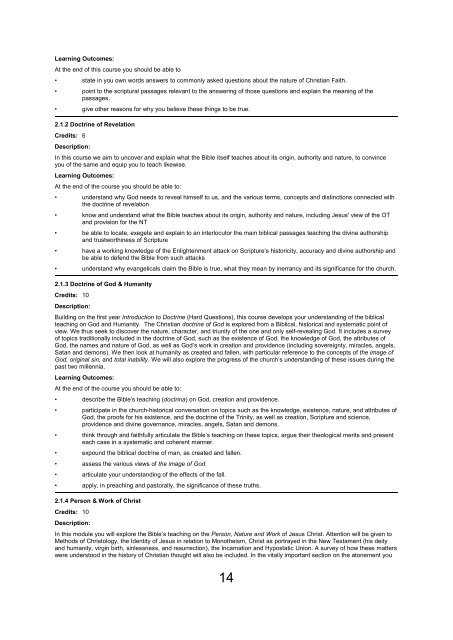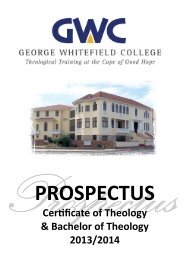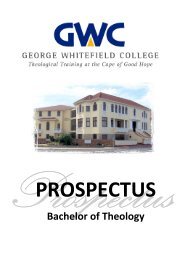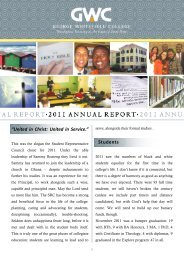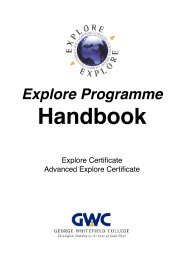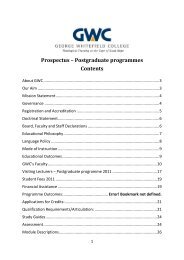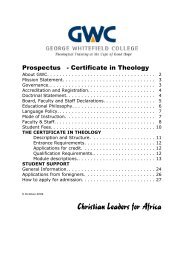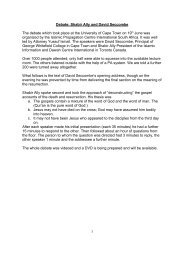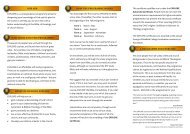Prospectus Bachelor of Theology Christian Leaders for Africa
Prospectus Bachelor of Theology Christian Leaders for Africa
Prospectus Bachelor of Theology Christian Leaders for Africa
Create successful ePaper yourself
Turn your PDF publications into a flip-book with our unique Google optimized e-Paper software.
Learning Outcomes:<br />
At the end <strong>of</strong> this course you should be able to<br />
• state in you own words answers to commonly asked questions about the nature <strong>of</strong> <strong>Christian</strong> Faith.<br />
• point to the scriptural passages relevant to the answering <strong>of</strong> those questions and explain the meaning <strong>of</strong> the<br />
passages.<br />
• give other reasons <strong>for</strong> why you believe these things to be true.<br />
2.1.2 Doctrine <strong>of</strong> Revelation<br />
Credits: 6<br />
Description:<br />
In this course we aim to uncover and explain what the Bible itself teaches about its origin, authority and nature, to convince<br />
you <strong>of</strong> the same and equip you to teach likewise.<br />
Learning Outcomes:<br />
At the end <strong>of</strong> the course you should be able to:<br />
• understand why God needs to reveal himself to us, and the various terms, concepts and distinctions connected with<br />
the doctrine <strong>of</strong> revelation<br />
• know and understand what the Bible teaches about its origin, authority and nature, including Jesus' view <strong>of</strong> the OT<br />
and provision <strong>for</strong> the NT<br />
• be able to locate, exegete and explain to an interlocutor the main biblical passages teaching the divine authorship<br />
and trustworthiness <strong>of</strong> Scripture<br />
• have a working knowledge <strong>of</strong> the Enlightenment attack on Scripture’s historicity, accuracy and divine authorship and<br />
be able to defend the Bible from such attacks<br />
• understand why evangelicals claim the Bible is true, what they mean by inerrancy and its significance <strong>for</strong> the church.<br />
2.1.3 Doctrine <strong>of</strong> God & Humanity<br />
Credits: 10<br />
Description:<br />
Building on the first year Introduction to Doctrine (Hard Questions), this course develops your understanding <strong>of</strong> the biblical<br />
teaching on God and Humanity. The <strong>Christian</strong> doctrine <strong>of</strong> God is explored from a Biblical, historical and systematic point <strong>of</strong><br />
view. We thus seek to discover the nature, character, and triunity <strong>of</strong> the one and only self-revealing God. It includes a survey<br />
<strong>of</strong> topics traditionally included in the doctrine <strong>of</strong> God, such as the existence <strong>of</strong> God, the knowledge <strong>of</strong> God, the attributes <strong>of</strong><br />
God, the names and nature <strong>of</strong> God, as well as God’s work in creation and providence (including sovereignty, miracles, angels,<br />
Satan and demons). We then look at humanity as created and fallen, with particular reference to the concepts <strong>of</strong> the image <strong>of</strong><br />
God, original sin, and total inability. We will also explore the progress <strong>of</strong> the church’s understanding <strong>of</strong> these issues during the<br />
past two millennia.<br />
Learning Outcomes:<br />
At the end <strong>of</strong> the course you should be able to:<br />
• describe the Bible’s teaching (doctrina) on God, creation and providence.<br />
• participate in the church-historical conversation on topics such as the knowledge, existence, nature, and attributes <strong>of</strong><br />
God, the pro<strong>of</strong>s <strong>for</strong> his existence, and the doctrine <strong>of</strong> the Trinity, as well as creation, Scripture and science,<br />
providence and divine governance, miracles, angels, Satan and demons.<br />
• think through and faithfully articulate the Bible’s teaching on these topics, argue their theological merits and present<br />
each case in a systematic and coherent manner.<br />
• expound the biblical doctrine <strong>of</strong> man, as created and fallen.<br />
• assess the various views <strong>of</strong> the image <strong>of</strong> God.<br />
• articulate your understanding <strong>of</strong> the effects <strong>of</strong> the fall.<br />
• apply, in preaching and pastorally, the significance <strong>of</strong> these truths.<br />
2.1.4 Person & Work <strong>of</strong> Christ<br />
Credits: 10<br />
Description:<br />
In this module you will explore the Bible’s teaching on the Person, Nature and Work <strong>of</strong> Jesus Christ. Attention will be given to<br />
Methods <strong>of</strong> Christology, the Identity <strong>of</strong> Jesus in relation to Monotheism, Christ as portrayed in the New Testament (his deity<br />
and humanity, virgin birth, sinlessness, and resurrection), the Incarnation and Hypostatic Union. A survey <strong>of</strong> how these matters<br />
were understood in the history <strong>of</strong> <strong>Christian</strong> thought will also be included. In the vitally important section on the atonement you<br />
14


